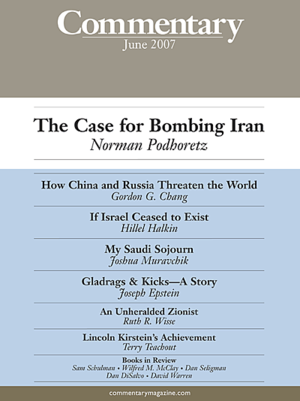Commentary
 From Conservapedia
From Conservapedia Commentary is a monthly magazine on politics, Judaism, social and cultural issues; founded by the American Jewish Committee in 1945. By 1960 its editor was Norman Podhoretz, a liberal at the time who moved sharply to the right in the 1970s and 1980s becoming a strong voice for the anti-communism left. The magazine was one of the leading voices of neoconservatism by 1976, and remains so today, although in the 21st century it has less influence than before.
Contents
History[edit]
Commentary was the successor to the Contemporary Jewish Record. When the Record's editor died in 1944, its publisher, the American Jewish Committee (AJC) consulted with New York intellectuals including Daniel Bell and literary critic Lionel Trilling. They recommended the AJC hire Elliot Cohen (1899-1959) to start a new journal. He had been an editor of a Jewish cultural magazine and was now a fundraiser.
Commentary had the mission being a nonpartisan journal focusing on Jewish affairs and other contemporary issues—a sort of Jewish Harper's, only more scholarly. Cohen designed the new magazine to reconnect assimilated Jews and Jewish intellectuals with the broader, more traditional and very liberal Jewish community. At the same time Commentary would bring the ideas of the young Jewish intellectuals to a wider audience. It demonstrated that Jewish intellectuals, and by extension all American Jews, had turned away from their past political radicalism to embrace mainstream American culture and values.
Cohen stated his grand design in the first issue:
- "With Europe devastated, there falls upon us here in the United States a far greater share of the responsibility for carrying forward, in a creative way, our common Jewish cultural and spiritual heritage...to harmonize heritage and country into a true sense of at-home-ness."
As Podhoretz put it, Commentary was to lead the Jewish intellectuals "out of the desert of alienation...and into the promised land of democratic, pluralistic, and prosperous America."
Cohen brought on board strong editors who themselves wrote important essays, including Irving Kristol; art critic Clement Greenberg; film and cultural critic Robert Warshow; and sociologist Nathan Glazer. Commentary paid well and published such rising stars as Hannah Arendt, Daniel Bell, Sidney Hook, and Irving Howe.
Although many or even most of the editors and writers had been socialists, Trotskyites or Stalinists in the past, that was no longer tolerated. Commentary articles were anti-Communist—but also anti-McCarthyite; it identified and attacked any perceived weakness among liberals on cold war issues, giving full backing to President Harry Truman's new Cold War policies such as the Truman Doctrine, the Marshall Plan, and NATO. The soft-on-Communism position of the CIO and Henry Wallace came under steady attack.
Liberals who vehemently hated Joe McCarthy were annoyed when Irving Kristol wrote at the height of the controversy,
- "there is one thing that the American people know about Senator McCarthy: he, like them, is unequivocally anti-Communist. About the spokesmen for American liberalism, they feel they know no such thing."
Podhoretz as editor, 1960-1995[edit]
In the late 1950s the magazine sagged, as Cohen suffered from mental illness. After he committed suicide Norman Podhoretz (b. 1930) took over in 1960, running the magazine with an iron hand until his retirement in 1995. Podhoretz, a brilliant pugnacious, and combative editor, was a protégé of Lionel Trilling. He reduced the space given to Jewish issues and, most importantly, moved Commentary's ideology sharply left. Circulation soared to 60,000 as the magazine became a mainstay of the Washington liberal elite in the heyday of Presidents John F. Kennedy and Lyndon B. Johnson.
Moving right[edit]
The emergence of the New Left—which was bitterly hostile to Johnson, to capitalism and to universities—angered Podhoretz by its shallowness and, especially, by its hostility to Israel in the 1967 war. Articles attacked the New Left on questions ranging from crime, the nature of art, drugs, poverty, and the new egalitarianism. Commentary sounded the tocsin: the New Left was a dangerous anti-American, anti-liberal, and anti-Semitic force. The shift helped define the emerging neoconservative movement and space to disillusioned liberals.
As the readership base shifted to the right, Commentary filled a vacuum for conservative intellectuals, who otherwise were dependent on William Buckley's National Review. In March 1975, Daniel Patrick Moynihan's article "The United States in Opposition," urged America to vigorously defend liberal democratic principles when they were attacked by Soviet-bloc and Third World dictatorships at the United Nations. Soon President Gerald Ford appointed Moynihan as ambassador to the United Nations, where his outspoken advocacy of American values led to election to the Senate in 1976. Political scientist Jeane Kirkpatrick's November 1979 denunciation of the foreign policy of President Jimmy Carter, "Dictatorships and Double Standards," impressed Ronald Reagan, who defeated Carter in 1980. In 1981 he appointed her to the United Nations ambassadorship and Commentary reached the apogee of its influence.
Current Staff[edit]
- Editor, Neal Kozodoy
- Senior Editor, Gabriel Schoenfeld
- Managing Editor, Gary Rosen
- Assistant Editor, David Billet
- Editor-at-Large, Norman Podhoretz
- Business Director, Sarah M. Stern
- Business Associate, Ilya Leyzerzon
- Sales Representative, Del Fidanque
- Production Manager, Marietta M. Gat
- Online Editor, Sam Munson
- Online Manager, Davi Bernstein
See also[edit]
- Commentary online
- Contentions, Commentary blog.
- Archive of back issues
Further reading[edit]
- Ehrman, John. "Commentary, the Public Interest, and the Problem of Jewish Conservatism," American Jewish History 87.2&3 (1999) 159-181. online in Project MUSE, scholarly article by conservative historian
- Podhoretz, Norman. Breaking Ranks (1979), memoir
Categories: [Neoconservativism] [Conservative Magazines] [Religion and Politics] [Judaism]
↧ Download as ZWI file | Last modified: 02/20/2023 13:40:10 | 70 views
☰ Source: https://www.conservapedia.com/Commentary | License: CC BY-SA 3.0
 ZWI signed:
ZWI signed:
 KSF
KSF